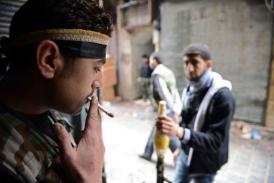By Alison Tahmizian Meuse (AFP)

Beirut – The main Islamist rebel groups in Aleppo, a key front line in Syria’s civil war, Monday rejected the newly-formed Syrian opposition bloc saying they want an Islamic state, as clashes raged countrywide.
“We, the fighting squads of Aleppo city and province, unanimously reject the conspiratorial project called the National Coalition and announce our consensus to establish an Islamic state” in Syria, a spokesperson announced in an internet video statement.
“We reject any external coalitions or councils imposed on us at home from any party whatsoever,” he said.
The unidentified speaker sat at the head of a long conference table with at least 30 other men and a black Islamist flag on the wall behind him.
He listed 14 armed groups as signatories to the statement, including the Al-Nusra Front, Ahrar Al-Sham and Liwa Al-Tawhid.
The Al-Nusra Front, which has become a formidable fighting force, has claimed the majority of suicide bombing attacks in Syria’s 20 deadly month-old conflict.
After the statement, another man held up a Quran, saying “make this your constitution” forcefully to the camera.
“God is greatest,” the group responded in unison.
Abdel Jabbar al-Okaidi, the head of the main rebel Free Syrian Army (FSA) in the embattled northern city of Aleppo, told AFP that the statement did not represent the opinion of all rebel groups in the province.
“These groups represent a number of military factions on the ground and reflect their position, but not all military forces in Aleppo agree with this,” the defected former army colonel told AFP by phone.
“The military council has announced its support for the National Coalition and is collaborating with them,” Okaidi added.
The newly-formed National Coalition aims to present a united front to the international community and is lobbying for weapons aid to help topple the regime of Syrian President Bashar Al-Assad.
On the ground, fighting flared along the Turkish border on Monday as rebels took full control of a large army base in the northern province of Aleppo that had been besieged for weeks, a military source and a watchdog said.
“The attack [on Base 46] was huge. The rebels used more than five tanks, mortars and missiles and the army was forced to retreat step by step,” the military source told AFP on condition of anonymity.
Many troops from the base were fighting elsewhere, so there were few units left guarding the 12 square kilometre base, situated atop a hill west of Aleppo, the source added.
Near the northern border with Turkey, fighting raged between rebels and Kurdish fighters in Ras al-Ain in Hasakeh province, the Britain-based Syrian Observatory for Human Rights reported.
The head of the local Kurdish People’s Assembly was shot dead by a sniper from one of the rebel battalions, the watchdog said.
The clashes erupted after a Kurdish demonstration demanding that all rebels not from the town leave. The insurgents refused and attacked Kurdish militiamen at a checkpoint, leaving nine wounded on both sides, the observatory said.
The Kurdish fighters belonged to the People’s Defence Units (YPG), the armed wing of the Democratic Union Party (PYD) which is linked to Turkey’s rebel Kurdistan Workers’ Party (PKK).
A Ras Al-Ain activist reported that tension has been high between rebels and the PYD since the insurgents took the town last week.
“The rebels burned a flag of the [Kurdish] Democratic Union Party and the Kurds reacted by burning the FSA flag,” Havidar told AFP.
Rebels accuse Kurdish groups of negotiating directly with the regime, contradicting the aims of the armed rebellion.
Elsewhere on the Turkish frontier, fighting broke out near a border post in the town of Kasab in Latakia province, the observatory said.
The watchdog, which relies on a network of activists and medics, puts the death toll in more than 20 months of conflict at upwards of 39,000.

